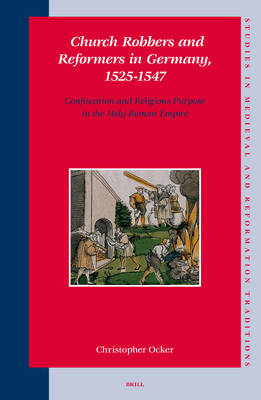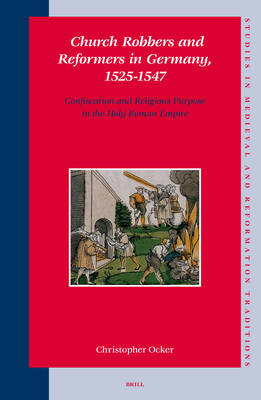
- Afhalen na 1 uur in een winkel met voorraad
- Gratis thuislevering in België vanaf € 30
- Ruim aanbod met 7 miljoen producten
- Afhalen na 1 uur in een winkel met voorraad
- Gratis thuislevering in België vanaf € 30
- Ruim aanbod met 7 miljoen producten
Zoeken
Church Robbers and Reformers in Germany, 1525-1547
Confiscation and Religious Purpose in the Holy Roman Empire
Christopher Ocker
€ 125,90
+ 251 punten
Omschrijving
This is a study of the religious controversy that broke out with Martin Luther, from the vantage of church property. The controversy eventually produced a Holy Roman Empire of two churches.
This is not an economic history. Rather, the book shows how acceptance of confiscation was won, and how theological advice was essential to the success of what is sometimes called a crucial if early stage of confessional state-building. It reviews the character of sacred property in the late Middle Ages, surveys confiscations in Reformation Germany on illustrative examples, summarizes the League of Schmalkalden's defense of confiscations, systematically studies theological memoranda that shaped a common policy in the League, and shows the role of that common position in religious politics.
This is not an economic history. Rather, the book shows how acceptance of confiscation was won, and how theological advice was essential to the success of what is sometimes called a crucial if early stage of confessional state-building. It reviews the character of sacred property in the late Middle Ages, surveys confiscations in Reformation Germany on illustrative examples, summarizes the League of Schmalkalden's defense of confiscations, systematically studies theological memoranda that shaped a common policy in the League, and shows the role of that common position in religious politics.
Specificaties
Betrokkenen
- Auteur(s):
- Uitgeverij:
Inhoud
- Aantal bladzijden:
- 360
- Taal:
- Engels
- Reeks:
- Reeksnummer:
- nr. 114
Eigenschappen
- Productcode (EAN):
- 9789004152069
- Verschijningsdatum:
- 30/06/2006
- Uitvoering:
- Hardcover
- Formaat:
- Genaaid
- Afmetingen:
- 165 mm x 246 mm
- Gewicht:
- 771 g

Alleen bij Standaard Boekhandel
+ 251 punten op je klantenkaart van Standaard Boekhandel
Beoordelingen
We publiceren alleen reviews die voldoen aan de voorwaarden voor reviews. Bekijk onze voorwaarden voor reviews.











